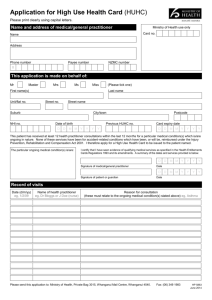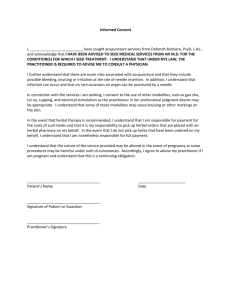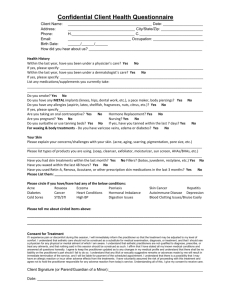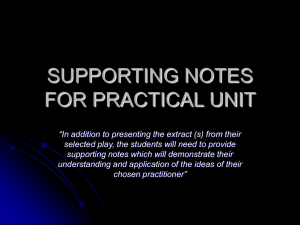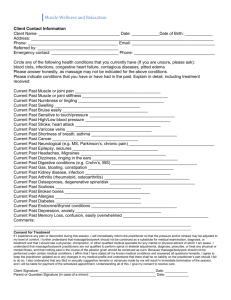Valerie De Laune, L.Ac. Alaskan Acupuncture, Inc.
advertisement
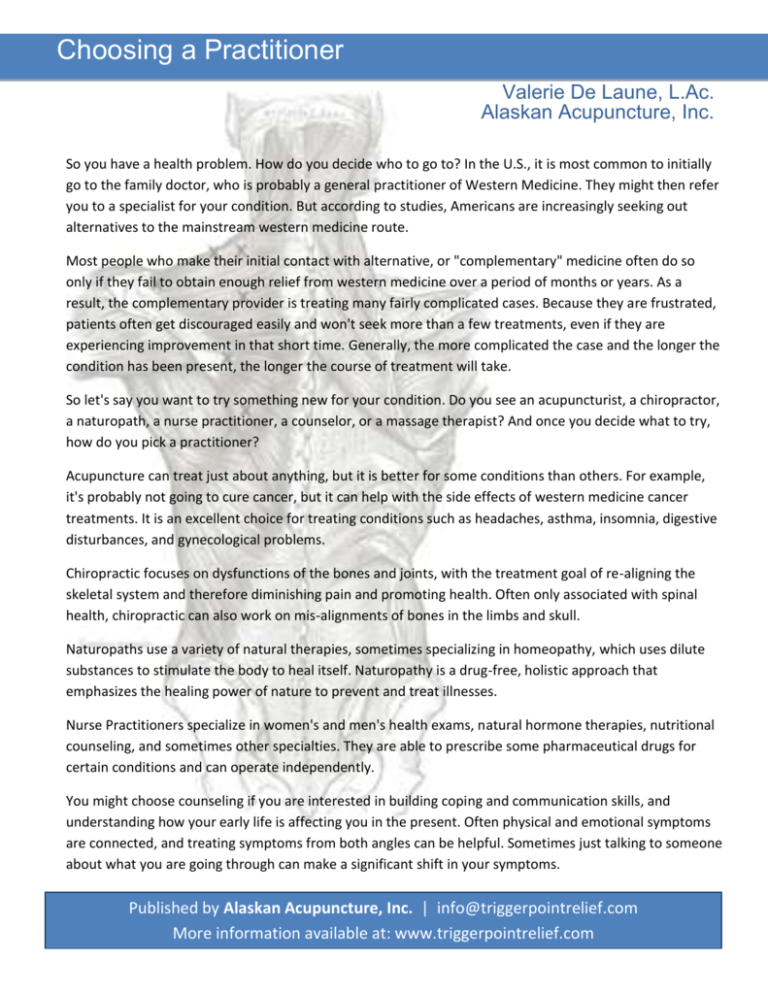
Choosing a Practitioner Valerie De Laune, L.Ac. Alaskan Acupuncture, Inc. So you have a health problem. How do you decide who to go to? In the U.S., it is most common to initially go to the family doctor, who is probably a general practitioner of Western Medicine. They might then refer you to a specialist for your condition. But according to studies, Americans are increasingly seeking out alternatives to the mainstream western medicine route. Most people who make their initial contact with alternative, or "complementary" medicine often do so only if they fail to obtain enough relief from western medicine over a period of months or years. As a result, the complementary provider is treating many fairly complicated cases. Because they are frustrated, patients often get discouraged easily and won't seek more than a few treatments, even if they are experiencing improvement in that short time. Generally, the more complicated the case and the longer the condition has been present, the longer the course of treatment will take. So let's say you want to try something new for your condition. Do you see an acupuncturist, a chiropractor, a naturopath, a nurse practitioner, a counselor, or a massage therapist? And once you decide what to try, how do you pick a practitioner? Acupuncture can treat just about anything, but it is better for some conditions than others. For example, it's probably not going to cure cancer, but it can help with the side effects of western medicine cancer treatments. It is an excellent choice for treating conditions such as headaches, asthma, insomnia, digestive disturbances, and gynecological problems. Chiropractic focuses on dysfunctions of the bones and joints, with the treatment goal of re-aligning the skeletal system and therefore diminishing pain and promoting health. Often only associated with spinal health, chiropractic can also work on mis-alignments of bones in the limbs and skull. Naturopaths use a variety of natural therapies, sometimes specializing in homeopathy, which uses dilute substances to stimulate the body to heal itself. Naturopathy is a drug-free, holistic approach that emphasizes the healing power of nature to prevent and treat illnesses. Nurse Practitioners specialize in women's and men's health exams, natural hormone therapies, nutritional counseling, and sometimes other specialties. They are able to prescribe some pharmaceutical drugs for certain conditions and can operate independently. You might choose counseling if you are interested in building coping and communication skills, and understanding how your early life is affecting you in the present. Often physical and emotional symptoms are connected, and treating symptoms from both angles can be helpful. Sometimes just talking to someone about what you are going through can make a significant shift in your symptoms. Published by Alaskan Acupuncture, Inc. | info@triggerpointrelief.com More information available at: www.triggerpointrelief.com Choosing a Practitioner, continued Massage therapy is ideal for both soft tissue acute injuries and chronic problems. There are many different types of massage and bodywork, so you may want to decide if your goal is relaxation or treating specific medical conditions before deciding which type of bodywork suits your needs. Whether shopping for a western or a complementary practitioner of any profession, there are several important considerations. First, ask around to see who your friends and family recommend. Keep in mind that the person who is right or wrong for them may not be the same for you, but it's a good place to start. Sometimes the provider is a good practitioner, but your personalities just aren't suited. If it is possible, try to talk to the practitioner briefly on the phone, just enough to see if you get a good feeling from them and they seem interested in helping you. They will not have time to discuss your case in detail, but should be able to answer a few questions for you. Next, see the practitioner once or twice and consider it an interview -- remember, you are hiring them to do a job for you. If you don't like your first few visits, interview another practitioner. Some questions to keep in mind: Do they seem knowledgeable about their profession and the condition for which you are seeking care? Do they seem to care whether you get better? Are they willing to refer you to other practitioners to help you with things they can't? Will they admit it if they don't know the answer to something, and look it up? Do they take you seriously and treat you with respect? Do they maintain appropriate practitioner-patient boundaries? Practitioner-patient boundaries can be less than clear in a small town where you know the practitioner from other areas of your life. Something that is unethical may not be illegal, and you may experience only a vague feeling of discomfort but not be able to define what is bothering you. Often abuse is very subtle and covert. If you have any doubts about whether a practitioner has violated your boundaries, visit www.advocateweb.org/basta/somethingwrong.htm. If you feel a practitioner may have done something unethical or illegal, there are several actions you can take. You can contact the practitioner's professional organization and/or licensing authority. If you need support and counseling, contact your local shelter, such as AWARE. If the practitioner has performed an illegal act or you're not sure, contact your local police department or an attorney for advice. Juneau is fortunate to have a wide variety of complementary providers. Don't give up hope and believe that your condition is untreatable. Someone may help improve the quality of your life even if your condition is "incurable". No one practitioner can be knowledgeable about and perform every type of treatment. You may just not have yet met the practitioner that knows something that may help. © 2001 Valerie DeLaune, LAc Published by Alaskan Acupuncture, Inc. | info@triggerpointrelief.com More information available at: www.triggerpointrelief.com


